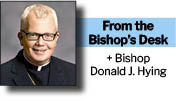
I am currently reading a fascinating book, Every Valley: The Desperate Lives and Troubled Times that made Handel’s Messiah by Charles King, which narrates both the complex history and the enduring legacy of one of the most popular musical masterpieces.
Messiah is a musical narration of salvation history, weaving together various Biblical narratives, both from the Old and New Testament, with a focus on the advent, death, and resurrection of Christ as God’s fundamental saving action, which rescues the human race from the curse of sin and death.
Handel’s original audience, deeply immersed in Christian doctrine and revelation, would have intuitively grasped this message of hope and meaning.
Given the long and deep secularization of the West, one would think this musical masterpiece would have lost its resonance today.
On the contrary, however, the book points out that contemporary performances of Messiah remain perennially popular and emotionally transformative, that this beautiful and masterful proclamation of the Christian story still resonates within human hearts and imbues a powerful sense of hope in the face of suffering and chaos. Why is this?
King writes, “Most remarkable of all, however, is the fact that a confection of spiraling solos and soaring choruses, its words ancient and opaque, somehow feels like a relevant grown-up way of engaging with the present. The text is filled with questions that sound wholly contemporary. There is despair at the disorder of the world . . . There is speculation about the finality of death and the legacies that we leave behind…There are affirmations that we need not think of life as a solo act, that we are lodged inside a universe far vaster than we can understand. (p. 13.)”
Answering questions
In grappling with the fundamental existential questions which every person must face, both the Scriptures and Messiah offer us meaning, hope, and purpose.
Don’t we all want answers to the important mysteries that life presents to us?
Questions like: Why are we here? Is my life just a random collision of circumstances, am I a highly evolved animal or am I an eternal incarnate spirit oriented towards God and transcendence? Why is there evil, suffering, and death? Do religion and science have anything to say to each other? Do heaven and hell actually exist? How do I forgive and find peace? What does authentic love look like?
The Bible proclaims the astonishing Truth of God’s reality, purpose for the world, plan for the human race, and His saving action in His Son, Jesus Christ, as the answer to all of our deepest questions.
Faith in Christ, the Lord of Life and the Savior of the world, becomes the interpretative key to understanding the mystery of creation, the arc of global history, and humanity’s final end.
This proclamation of the Scriptural story is the essence of the kerygma, the fundamental narrative of the Gospel — God created us for eternal relationship with Himself; sin and death ruptured our connection to God; the Father sends us His Son to rescue and restore us; freed and forgiven, saved by His Blood, we serve as disciples of the Lord, giving witness to Jesus through lives of holiness, prayer, and service.
This kerygma — think of it as our basic Catholic elevator speech — is at the heart of our whole Go Make Disciples evangelizing initiative.
A new world with Christ
Last month, in the beautiful days of Advent, we heard the prophetic writings of Isaiah proclaimed often in the liturgy.
Living in a time of great social upheaval, violence, and chaos, Isaiah envisioned the coming of a Messiah who would usher in the Kingdom of God and eradicate the power of sin and death.
In other words, he imagined a world different than his own, where peace and justice reign and darkness has no hold on the sweep of human history or the desires of the human heart.
Reflecting on Martin Luther King’s utilization of Messiah in his advocacy for racial justice, the author Charles King writes, “King’s message was about loving one’s enemies rather than despising them, and he found a similar idea running like a glinting thread through Handel’s words and music. In a world of pain and suffering, the triumph of goodness depends on the radical power of acting contrary to expectations. The first step, King taught, is to imagine a world fundamentally different from the one outside your front door.” (p. 14)
Through our sacramental and mystical union with Christ in the Church, we have already stepped into the vast beautiful world of the Resurrection, where sin and death cannot prevail.
Yes, we still sin, suffer, and die, but for those who believe and practice the fullness of our Faith, none of those things have ultimate power over us, for we have placed all of our hopes in the One who loves us to the end.
In Christ and His victory, we can already picture what a just and merciful world looks like, because we have been grasped by His mysterious and mighty grace.
This Jubilee Year of Hope is a sacred time to be deeply immersed in the Christian love story and to proclaim our Messiah and His Gospel from the housetops!

